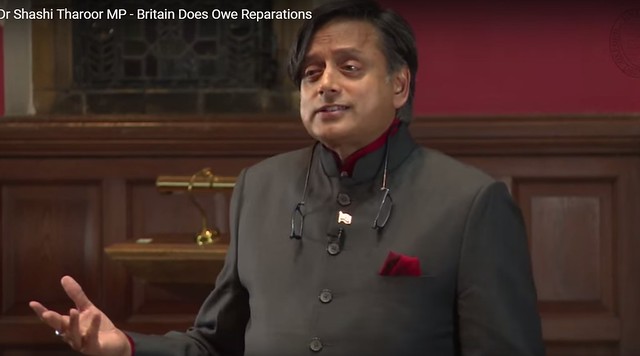By Jaspal Singh
Recently Shashi Tharoor, a Congress party Member of Parliament, participated in a debate on reparations for colonial rule by Britain in Oxford university. Those who were opposed to the reparations argued that it is very difficult to quantify the colonial plunder and that the British brought railways, telegraph and other modern amenities to the colonies such as India and on top of it all, the colonialists brought rule of law and democracy to the colonies. They also argued that British colonialists also had local collaborators as well who benefited tremendously from colonial rule.

Screen grab from Shashi Tharoor’s Oxford Union speech.
There were several speakers from Africa and, the Caribbean who argued for reparations. Shashi Tharoor argued the case for reparations for India. He eloquently demolished the arguments of the opposite side. He pointed out that it is very easy to quantify the plunder. Just during the First World War alone close to 8 billion pounds worth of goods were extracted by Britain from India, more than a million soldiers from India were used as cannon fodder .During the Second World War close to two and a half million Indians were pressed into service of the colonial army. More than one and a half billion pounds were also extracted from India by the British. He pointed out that more than 20 million people died in the man-made famines by the British, biggest among them was the Bengal famine and during which Churchill deliberately diverted food from starving Indians to other parts the world. As far as railways and telegraph is concerned, many countries have developed them without being colonized. He pointed out that the British deindustrialized India and it was the plunder from India which paid for the industrialization of Britain. He gave the famous example of Dacca Muslin workers whose thumbs were cut off by the British. All this plundered enriched a small ruling elite in Britain.
The Oxford Union overwhelmingly voted in favour of reparations. Shashi Tharoor’s speech has become very popular in India and abroad. Even the prime minister praised it. All the media has also been praising it.
All the arguments that Shashi Tharoor gave about the British colonialism are also completely applicable to internal colonialism and plunder that the rulers of India have been engaged in since 1947.From Nehru to Modi this plunder by Brown Sahibs has been going unabated using all the colonial laws and apparatus. People from different parts of India have been rising up against this plunder. For example Punjabis have pointed out time and again about the loot of grain, water and other natural and human resources by the Center. People from Northeast, Jharkhand , Chhatisgarh, Kashmir and many other areas have raised the banner of revolt against this internal colonialism.
According to three reports published recently,928 families in India have more wealth than 25 percent of the population of India and 10 percent of population owns 90 percent of wealth of the country. It has also revealed that close to 50 percent of Indians do not have enough food to eat. More than 30 percent of the country is occupied by the army at any given time. More than 4 million children die every year because the government refuses to provide clean drinking water.
This internal colonial plunder has greatly benefitted those who collaborated with the British and are now at the helm of affairs. For instance, Gujarat government gave Tata, one of the collaborators of the Britiish, one thousand acres of land for one rupee an acre per year on lease. It also gave Tata a loan of Rs.33,000 crores on 0.015 percent interest, payments for which will start after 20 years. Other places have the same story. This internal colonialism of Brown Sahib is doing exactly same what the British colonialism was doing.
There is a growing body of literature in India about internal colonialism. Scholars, activists, theorists are reflecting on this state of affairs. Some are also asking for reparations from the central government for death and destruction rained on them and loot and plunder of their resources. Some have raised the banner of autonomy and self-determination.
A friend asked me whether a debate on internal colonialism and reparations can take place in Delhi and whether Shashi Tharoor and the Prime minister will argue the case for reparations. My hunch is in the negative.
……
Jaspal Singh is a Cambridge-based philosopher.

